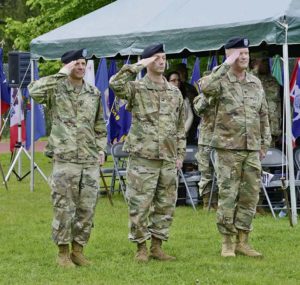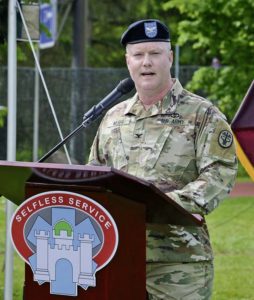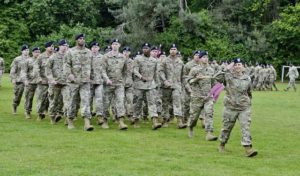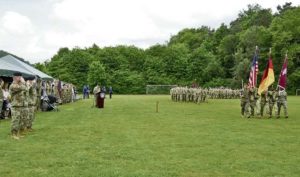by Alofagia Oney
Regional Health Command Europe
Landstuhl Regional Medical Center conducted a change of command ceremony, May 29, at the Landstuhl Parade Field recognizing outgoing commander, Col. Timothy L. Hudson, and welcoming incoming commander, Col. Michael A. Weber.
Weber, who is triple-board certified in general surgery, vascular surgery and management, became the 34th commander at LRMC, marking his second time in command of a military medical center. Weber comes to LRMC from Stuttgart, Germany, where he was the command surgeon for U.S. Africa Command.

This isn’t Weber’s first assignment to the Kaiserslautern Military Community, having been previously assigned to the 13th Chemical Company in Baumholder, in 1988. Weber was the chief of vascular surgery and the vascular surgery fellowship program director at Walter Reed Army Medical Center, where he led the planning and execution of the vascular surgery service relocation to Walter Reed National Military Medical Center in Bethesda, Md. in 2011. His tie to LRMC was, however, ever-present throughout his medical career.
“In 2001, I was the surgical chief resident at Walter Reed and I received casualties who were treated at LRMC after receiving severe injuries in Afghanistan,” said Weber during his first remarks as the hospital commander. “When I was deployed to [both Kuwait and Iraq], I can remember the relieved faces of my patients as they learned they were being evacuated to Landstuhl Regional Medical Center.”
Despite never having been assigned to LRMC before taking command, Weber made it clear that his perspective as the new commander of the hospital was shaped by its reputation.
“I have stood in awe of this medical center for over 30 years,” he said. “It is my hospital. It is my family’s hospital. And very importantly, it is the joint warfighter’s hospital.”
The reviewing officer over the change of command ceremony was Brig. Gen. Ronald T. Stephens, commanding general of Regional Health Command Europe and command surgeon for U.S. Army Europe. Following the ceremonial inspection of troops and passing of the unit colors symbolizing the transfer of authority over the hospital from the outgoing and incoming commanders, Stephens shared his confidence in Weber’s ability to lead.
“[Weber’s] career thus far includes a variety of clinical and command billets and operational deployments that have prepared him well for this new role,” said Stephens. “I am confident his leadership will enable LRMC to continue to ensure U.S. forces in the European theater and beyond are medically ready to meet the demands of the mission.”
Weber assumed command from Col. Timothy Hudson, who took command of LRMC in June 2017. Under Hudson’s command, LRMC and its geographically separated clinics conducted more than 1.1 million outpatient visits, saw 48,000 patients in the emergency room, wrote more than 800,000 prescriptions and helped families bring over 1,500 babies into the world.
“As the LRMC commander, [Hudson] created and executed a strategic vision that ensured the delivery of professional, reliable and innovative care by a team of 3,000 Soldiers, Airmen, Sailors, Marines, civilians and local nationals who are all devoted to excellence,” said Stephens.
During his remarks to the family, friends, honored guests and hospital staff in attendance, Hudson discussed leadership and provided key takeaways from his time in command.
Hudson challenged leaders to own the problems that they face, rather than pass them onto subordinates. He also encouraged them to be engaged leaders who are not afraid to talk, cry and hurt with their teammates.


“Take risk, and go to bat for your people,” said Hudson. “Have moral courage. Do not be a coward.”
One of Hudson’s primary objectives as the hospital commander was to create a family environment amongst staff, where building relationship was a cornerstone of everyday work life.
“People will remember how you make them feel,” he said. “I hope I’ve been successful in sharing my passion and energy with as many of you as possible in the last two years.”
In his final words to staff, Hudson issued a challenge to them, stemming from a conversation he had with a mentor from years past.
“Landstuhl, the very name that has transcended the location, city, the medical center or any service, whether Army, Air Force, Navy or Marine working in these hallowed halls,” he said. “It is the embodiment of hope for those who come from theater that they will be repaired, that they will live, and we are their first step back into the world. For their family, [LRMC] represents relief that their loved ones will be okay, and that they are coming home. No other medical center in the entire military health system has such a heavy responsibility to get it right. You must get it right.”
LRMC is the largest American military medical center outside of the United States and plays a strategic role as the sole evacuation and tertiary referral center for five combatant commands. LRMC is accredited by the Joint Commission and is the only American College of Surgeons verified Level III Trauma Center outside of the U.S.



